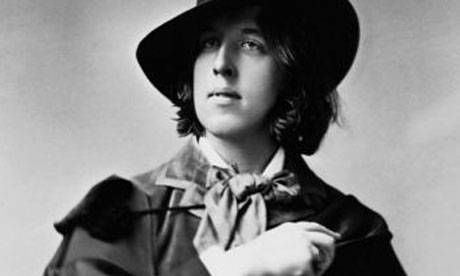
Happy Birthday, Oscar Wilde, and Thanks for the Wisdom
I was in Ireland about eleven years ago. It was raining outside, of course, and inside, there was an hour-long Oscar Wilde monologue play in which one man stood on stage in the role of the author. I was a touch nervous about my attention span—monologues demand a lot from the audience. Yet, somehow, I did not get bored as the rain flew outside and the actor stood with perfect posture on stage. Oscar Wilde’s life is that interesting, the actor was that good, and it felt important somehow to hear a new variation of Wilde’s voice.
Today, October 16th, he would have been 163 years old, if somehow magically still kicking.
Though he’s been gone a while, his voice is still around, in the classroom and outside of it, with constant quotations floating on Pinterest, Facebook and Instagram. In August it was announced that his novel, A Picture of Dorian Gray, is being made into another adaptation directed by St. Vincent (Annie Clark), though this time with an all-female cast. We are still willing to consider this man’s work and we are still willing to mess with the audience’s expectations of the work, which says something. Wilde noted in his preface to A Picture of Dorian Gray that “Diversity of opinion about a work of art shows that the work is new, complex and vital.” It’s pretty fantastic that we feel this work from 1890 can still feel vital.
Wilde’s reputation for cleverness in his writing and his speech has painted him as a unique character, so that often his modern audience is focused more on his personality than on his written work. He is one of the many people of his time treated horribly for his sexuality—something that The New Republic discusses with depth here.
And of course, we are pretty obsessed with Wilde quotes. I want to just spend a moment talking about one out of many. He said:
“A writer is someone who has taught his mind to misbehave.”
I love what this quote implies about how we see writers and artists. The concept of misbehaving comes in relation to societal expectations—if we didn’t have expectations placed on our behavior, then we wouldn’t have rules to break. But, applying the active concept of misbehaving to the less obvious movement of the mind, we recognize so many amazing human qualities—genius, imagination and internal freedom.
This is an important concept that allows people to accept where their minds can go, and maybe even value where their minds can go. That is the root of being an artist, right? Of course it’s depressing, too, because for Oscar Wilde, who was generally judged and eventually criminally prosecuted and imprisoned for homosexuality, accepting yourself and your mind was a more dangerous prospect in his location and lifetime.
If you are interested in this idea and going beyond the quote, here are other authors who discuss the internal, but at length:
Jamaica Kincaid talks about the process of her thinking as she wrote.
Alice Walker writes on how meditation opened up her writing.
See how thinking about Oscar Wilde’s wisdom opens doors?
And while Oscar Wilde’s viewpoint gives us a brief and poetic line to think on, the complexity of what the writer’s mind goes through is still that never-ending mystery, even to those who live it.
So thanks, Oscar Wilde, for helping us think. Oh, and Happy Birthday.

















